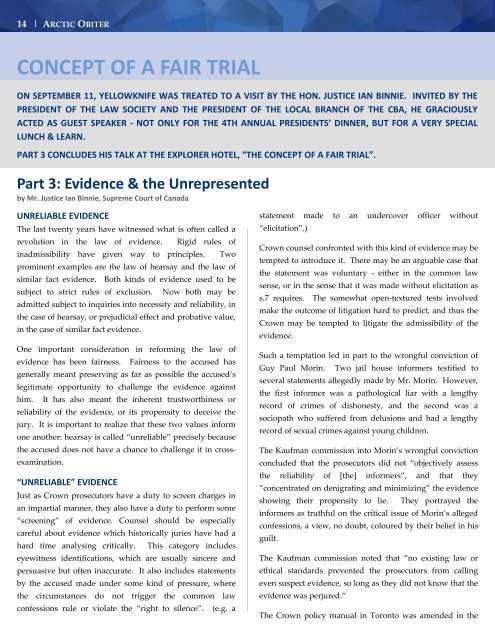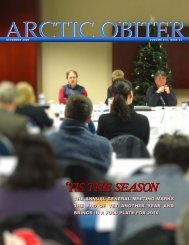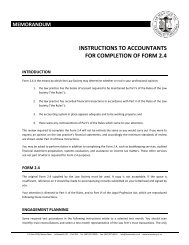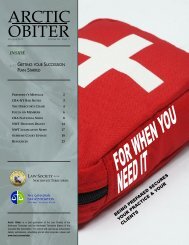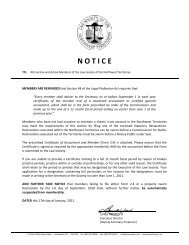ARCTIC OBITER
November 2009 - Law Society of the Northwest Territories
November 2009 - Law Society of the Northwest Territories
Create successful ePaper yourself
Turn your PDF publications into a flip-book with our unique Google optimized e-Paper software.
14 | <strong>ARCTIC</strong> <strong>OBITER</strong><br />
CONCEPT OF A FAIR TRIAL<br />
ON SEPTEMBER 11, YELLOWKNIFE WAS TREATED TO A VISIT BY THE HON. JUSTICE IAN BINNIE. INVITED BY THE<br />
PRESIDENT OF THE LAW SOCIETY AND THE PRESIDENT OF THE LOCAL BRANCH OF THE CBA, HE GRACIOUSLY<br />
ACTED AS GUEST SPEAKER - NOT ONLY FOR THE 4TH ANNUAL PRESIDENTS’ DINNER, BUT FOR A VERY SPECIAL<br />
LUNCH & LEARN.<br />
PART 3 CONCLUDES HIS TALK AT THE EXPLORER HOTEL, “THE CONCEPT OF A FAIR TRIAL”.<br />
Part 3: Evidence & the Unrepresented<br />
by Mr. Justice Ian Binnie, Supreme Court of Canada<br />
UNRELIABLE EVIDENCE<br />
The last twenty years have witnessed what is often called a<br />
revolution in the law of evidence. Rigid rules of<br />
inadmissibility have given way to principles. Two<br />
prominent examples are the law of hearsay and the law of<br />
similar fact evidence. Both kinds of evidence used to be<br />
subject to strict rules of exclusion. Now both may be<br />
admitted subject to inquiries into necessity and reliability, in<br />
the case of hearsay, or prejudicial effect and probative value,<br />
in the case of similar fact evidence.<br />
One important consideration in reforming the law of<br />
evidence has been fairness. Fairness to the accused has<br />
generally meant preserving as far as possible the accused’s<br />
legitimate opportunity to challenge the evidence against<br />
him. It has also meant the inherent trustworthiness or<br />
reliability of the evidence, or its propensity to deceive the<br />
jury. It is important to realize that these two values inform<br />
one another: hearsay is called ‚unreliable‛ precisely because<br />
the accused does not have a chance to challenge it in crossexamination.<br />
“UNRELIABLE” EVIDENCE<br />
Just as Crown prosecutors have a duty to screen charges in<br />
an impartial manner, they also have a duty to perform some<br />
‚screening‛ of evidence. Counsel should be especially<br />
careful about evidence which historically juries have had a<br />
hard time analysing critically. This category includes<br />
eyewitness identifications, which are usually sincere and<br />
persuasive but often inaccurate. It also includes statements<br />
by the accused made under some kind of pressure, where<br />
the circumstances do not trigger the common law<br />
confessions rule or violate the ‚right to silence‛. (e.g. a<br />
statement made to an undercover officer without<br />
‚elicitation‛.)<br />
Crown counsel confronted with this kind of evidence may be<br />
tempted to introduce it. There may be an arguable case that<br />
the statement was voluntary - either in the common law<br />
sense, or in the sense that it was made without elicitation as<br />
s.7 requires. The somewhat open-textured tests involved<br />
make the outcome of litigation hard to predict, and thus the<br />
Crown may be tempted to litigate the admissibility of the<br />
evidence.<br />
Such a temptation led in part to the wrongful conviction of<br />
Guy Paul Morin. Two jail house informers testified to<br />
several statements allegedly made by Mr. Morin. However,<br />
the first informer was a pathological liar with a lengthy<br />
record of crimes of dishonesty, and the second was a<br />
sociopath who suffered from delusions and had a lengthy<br />
record of sexual crimes against young children.<br />
The Kaufman commission into Morin’s wrongful conviction<br />
concluded that the prosecutors did not ‚objectively assess<br />
the reliability of [the] informers‛, and that they<br />
‚concentrated on denigrating and minimizing‛ the evidence<br />
showing their propensity to lie. They portrayed the<br />
informers as truthful on the critical issue of Morin’s alleged<br />
confessions, a view, no doubt, coloured by their belief in his<br />
guilt.<br />
The Kaufman commission noted that ‚no existing law or<br />
ethical standards prevented the prosecutors from calling<br />
even suspect evidence, so long as they did not know that the<br />
evidence was perjured.‛<br />
The Crown policy manual in Toronto was amended in the


